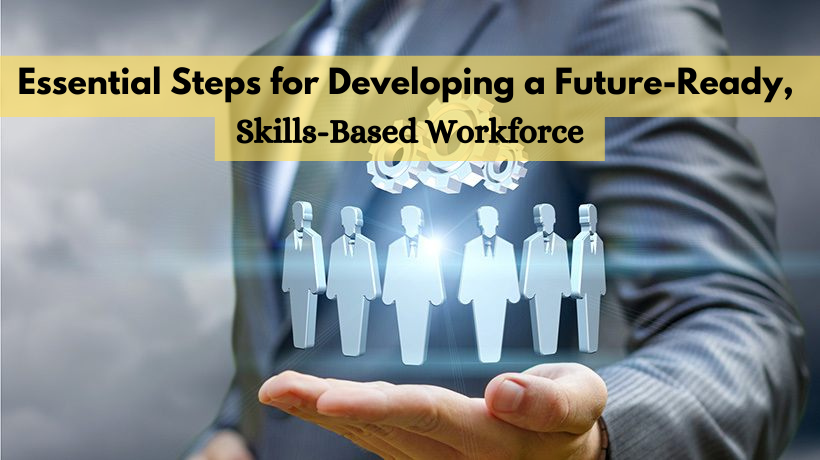Essential Steps for Developing a Future-Ready, Skills-Based Workforce
Organisations across all industries and sectors in the UAE and Saudi Arabia face the challenge of continuously preparing for the future. Workforce skills are an essential component. How do you make sure you have the skills you need not only today, but tomorrow? What are those skills and how do you develop a workforce with a sufficient level of competency?
In the first blog in this series, we looked at the main factors driving change, as well as the emergence of the skills-based organisation.
You can enhance the skills available in your organisation through recruitment, but one of the main takeaways from the previous blog is the importance of developing the skills of your existing workforce. This includes developing new skills, particularly adjacent skills, as well as refining and improving existing skills.
A focus on skills development not only makes your company more equipped for the changes and challenges of the future, but it also improves morale, motivation, and satisfaction levels in your workforce.
How do you develop a future-ready, skills-based workforce? How do you ensure skills development is happening at a fast enough pace?
Foster an Intentional Learning Mindset
When thinking about skills development in your workforce, a good starting point is to understand that learning itself is a skill.
It has been clear for some time now that the job for life no longer exists. The job for life has been replaced by a continuous need to refresh, enhance, and develop new skills. This is known by employers, but employees also know the job for life is no longer a reality.
However, skills gaps still exist, despite efforts by organisations to offer training opportunities to their employees. One of the reasons for this is a lack of intentional learning mindsets.
It isn’t enough to just offer learning opportunities and courses to employees. It is also important to establish and nurture an intentional learning mindset.
An intentional learning mindset involves moving beyond a situation where learning is separated from day-to-day work streams. In other words, where your employees must always stop what they are doing to partake in learning.
Instead, learning should happen all the time through structured e-learning courses, just-in-time e-learning content, on-the-job training, and crucially, via every interaction, situation, and experience they have.
The Importance of a Growth Mindset
Senior executives understand the importance of having a growth mindset. If your organisation is not growing, it is falling behind. To have an intentional learning mindset, employees also need an individual growth mindset.
If employees feel they have already maximised their talents or abilities, they will not have sufficient motivation to learn. A growth mindset, on the other hand, involves believing you can always get better. Part of having a growth mindset is being open to failure and viewing failures as learning opportunities.
The Importance of Curiosity
To develop intentional learning mindsets, it also helps to allow employees to pursue topic areas and skills they are interested in and curious about. There must be alignment with business needs, of course, but learners have significantly higher motivation levels when they are interested in the topic they are learning about.
Other Essential Steps for Accelerating Skills Development
Fostering an intentional learning mindset is a crucial foundation for developing a future-ready, skills-based workforce. There are also other steps you can take, including:
- Customise learning pathways
- Care about content
- Emphasize the importance of all skills
- Prioritise leadership training
Customise Learning Pathways
There is a phrase that will become increasingly commonplace in the years ahead, particularly as technologies like machine learning and the metaverse continue to influence training strategies. That phrase is the class size of one.
In other words, developing training content on an individual level. That is a big concept, particularly in organisations with tens of thousands of employees. However, the class size of one concept points to a trend that is important today – customised learning pathways.
It is beneficial to move away from the one-size-fits-all approach to learning by implementing as much customisation as possible, particularly in relation to the pathway individual employees follow as they develop and enhance their skills.
Care About Content
Whatever strategy is adopted to accelerate the continuous development of skills in your workforce, it is essential to never lose sight of the importance of quality content. Whatever training materials are provided, considerable care should be taken in the creation of content. This particularly applies to structured training, such as an e-learning course.
Emphasize the Importance of All Skills
Hard skills are an essential component of developing a future-ready, skills-based workforce. In other words, the skills that directly enable workers to do their jobs. However, it also helps to encourage the development of potential and adjacent skills.
- Adjacent skills – skills not directly related to day-to-day tasks, but that can enhance understanding and have the potential to be beneficial in the future.
- Potential skills – where an employee has some knowledge and interest in a particular area that can be further developed.
It is also crucial to encourage and facilitate the continuous development of soft skills across all levels and areas of responsibility.
Prioritise Leadership Training
One skill that straddles the hard and soft categories is leadership. Leadership training should be a priority, even for employees that don’t want to pursue a career path that takes them into a management role. The benefits of good leadership skills extend beyond the responsibilities of managers, so it is beneficial to prioritise their development.
An Evolutionary Approach
Developing a skills-based, future-ready workforce is an ongoing effort. It’s an evolution, so the best time to start is now. By fostering an intentional learning mindset in your team and providing employees with opportunities to enhance existing skills and develop new ones, your organisation will become more agile, competitive, and relevant to your customers.

